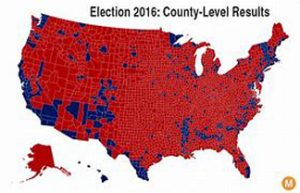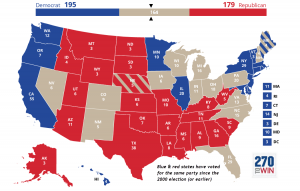֎ Mariner has written in past posts about Earth’s polar magnetic field flipping erratically in the Bering Sea and the southern Atlantic. The following summary is copied from the current Science Magazine:
Kauri trees mark magnetic flip 42,000 years ago
By Paul Voosen
Using a remarkable record from a 42,000-year-old kauri tree preserved in a bog, researchers have pieced together a record of the last time Earth’s protective magnetic field weakened and its poles flipped—known as the Laschamp excursion—exposing the world to a bombardment of cosmic rays and, the team suggests, briefly shifting Earth’s climate. The record shows the field nearly failed prior to its brief swap, which only lasted 500 years. Combined with an unusually quiet Sun that is believed to have occurred during this time, cosmic rays could have caused a notable drop in stratospheric ozone, shifting wind flows and climate patterns, they suggest.[1]
֎ Bad Omens
Here’s what history tells us about what’s next for Trumpism. “From Berlusconism in Italy to Perónism in Argentina and Fujimorismo in Peru, personality-driven movements rarely fade once their leaders have left office.”
Trump’s county-level 2016 election map (red means GOP win):

“To the frustration of those Republicans who want to steer a new course, state-party committees have become the strongest redoubts of Trumpism,” Russell Berman reported last week.
| Censured by a state GOP |
|
Supported Biden’s … |
Voted in favor of Trump’s … |
|
Campaign* |
Certification** |
Senate Trial† |
Impeachment†† |
| Sen. Burr |
|
✓ |
|
✓ |
| Sen. Cassidy |
|
✓ |
✓ |
✓ |
| Rep. Cheney |
|
✓ |
|
✓ |
| Gov. Ducey |
|
✓ |
|
|
| Ex-Sen. Flake |
✓ |
✓ |
|
|
| Cindy McCain |
✓ |
✓ |
|
|
| Rep. Rice |
|
|
|
✓ |
| Censured by a county GOP or multiple counties |
|
Supported Biden’s … |
Voted in favor of Trump’s … |
|
Campaign* |
Certification** |
Senate Trial† |
Impeachment†† |
| Rep. Kinzinger |
|
✓ |
|
✓ |
| Sen. McConnell |
|
✓ |
|
|
| Rep. Newhouse |
|
✓ |
|
✓ |
| Sen. Sasse |
|
✓ |
✓ |
✓ |
| Rep. Upton |
|
✓ |
|
✓ |
*Actively endorsed Biden.
**Acknowledged or supported certification of Biden’s victory before or on Jan. 6-7.
†Voted in favor of constitutionality of Trump Senate trial.
††Voted for either impeachment in the House or conviction in the Senate.
Officials censured by both state and local GOPs are categorized by the highest censure they received.
Source: News Reports
America’s next authoritarian will be much more competent. As Zeynep Tufekci[2] warned back in November: “It won’t be easy to make the next Trumpist a one-term president.” To wit from Axios:
“Trump advisers will meet with him at Mar-a-Lago this week to plan his next political moves, and to set up the machinery for king making in the 2022 midterms. Trump is expected to stoke primary challenges for some of those who have crossed him, and shower money and endorsements on the Trumpiest candidates. State-level officials, fresh off censuring Trump critics, stand ready to back him up.” [Currently given only thin margins for the democrats in both the Senate and the House, any success by Donald or his nationalist party likely will flip Congress red. AM]
Remember that 70 million citizens voted for Donald in spite of himself and his authoritarian politics. The clouds look familiar – like the clouds in Germany in the early 20th century. It is time for the public to educate itself on fascism. A good reference is Madelyn Albright’s book, “Fascism, A warning”. Banished after the second world war, Fascism is on the rise again, from North Korea to Hungary and Turkey, while a newly introspective America at best looks the other way, sometimes even offers encouragement. Madeleine Albright’s book is a warning aimed at all of us to look up from our petty partisan bickering.
֎ The good news is now that Joe is President and has made overtures to Europe, the Western Alliance quickly is re-energizing itself to deal with Russia, cyber warfare, big data, global warming and repairing trade arrangements. Still, the rubber meets the road when the alliance bumps into Brexit, immigration, EU dictatorships along the eastern front and Germany, who did not wait for Donald to leave and has built trade liaisons with Russia and China.
Remember when the news was just five minutes of simple headlines? Walter Cronkite would be astonished!
Ancient Mariner
[1] For those curious why the magnetic field flips, it is caused by the Earth’s iron core rotating at a different speed than surface layers of the planet. Eventually what can be represented as static electricity disrupts the magnetic balance – just like lightning or touching something while walking in your socks across the rug. Unlike the instantaneousness of lightning, the mass of the entire Earth acts like a capacitor, slowing the change to thousands of years.
[2] ZAY-nep tuu-FEK-chee) is a sociologist and writer. Her work focuses on the social implications of new technologies, such as artificial intelligence and big data.


